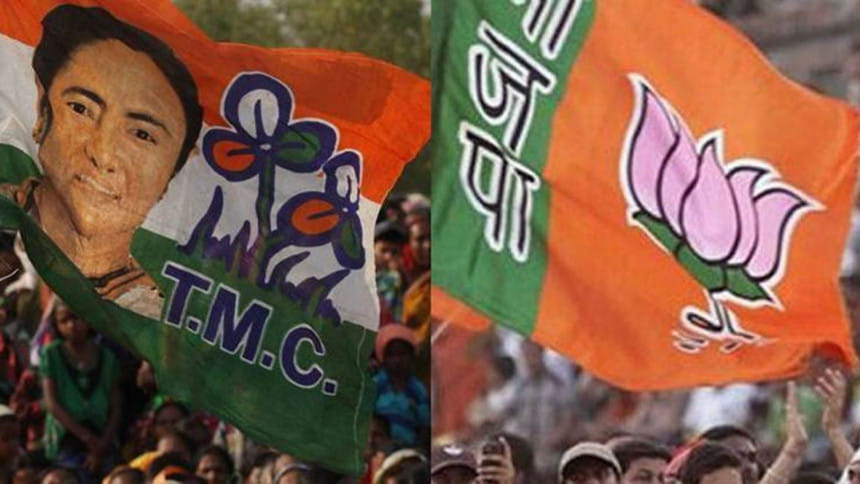West Bengal Assembly Polls: Muslim votes key in 7th phase

Muslim voters are set to be a key factor as incumbent government of Trinamool Congress (TMC) and its rival Bharatiya Janata Party (BJP) lock horns in the seventh phase of West Bengal assembly polls today.
All eyes will also be on some high-profile constituencies in Kolkata, where some key ministers of TMC are contesting.
Voting will be held in 34 out of 36 constituencies as polling for two assembly seats in Samserganj and Jangipur in Murshidabad district was cancelled following the death of two candidates with Covid-19.
Murshidabad and Malda districts are considered "pockets of Muslim majority voters", where TMC will look to continue its dominance, said election experts.
At the same time, the BJP will want to secure prestigious seats like Bhabanipur, Rashbehari, Kolkata Port and Ballygunge, currently represented by some senior TMC ministers, said the experts.
According to the 2011 census, Murshidabad has 66.27 percent Muslim population, whereas Malda's population includes 51.2 percent Muslims.
On the other hand, Congress and its left ally Communist Party of India (Marxist), referred as CPIM, will bank on the large number of minority voters in Murshidabad and its neighbouring Malda as the two districts are usually the strongholds of the alliance, especially Congress.
As per the election schedule, in this phase, polling will be held in six seats each in South Dinajpur and Malda, 11 in Murshidabad, nine in West Burdwan and four in Kolkata.
During the campaign, TMC supremo Mamata Banerjee sought support from the Muslim community and urged them to avoid any split in votes.
The BJP, during its electioneering, blasted both the TMC and the National Congress for patronising Muslims, in its efforts to unite Hindu voters.
Among the 36 seats in the last assembly polls in 2016, TMC got 14 seats and had secured 37 percent votes while the left-Congress combined won in 22 seats and had got 44 percent votes. BJP failed to win a single one.
But the picture was different in Lok Sabha elections (national polls) in 2019 when BJP got 37 percent votes, which was very close to TMC's 39 percent. If the 2019 Lok Sabha election is something to go by, BJP is leading in 16 assembly seats, TMC in 16 seats and Congress in the rest of the four seats.
In this phase of the polling, all eyes will be on the Bhabanipur assembly seat, which is the home turf of West Bengal Chief Minister Mamata Banerjee.
But Banerjee is contesting from Nandigram this time around and nominated one of her senior most party leaders and her cabinet member Sovandeb Chattopadhyay to contest from Bhabanipur.
The BJP has fielded actor-turned-politician Rudranil Ghosh, who left the TMC a few months ago to join the BJP, from this seat.
WB Chief Minister achieved a massive victory from Bhabanipur in the 2011 by-elections. Then in the 2016 assembly elections, she repeated her triumph.
But this time, Mamata contests against her once-trusted aide Suvendu Adhikari of the BJP.
Bhabanipur seat was earlier represented by Siddhartha Shankar Ray in 1957 and 1962. Later, he became the chief minister of West Bengal in 1972.
Kolkata Port seat is the stronghold of the TMC where Urban development minister and former Kolkata mayor Firhad Hakim, also a close aide to Mamata, is contesting. He won the constituency twice since 2011.
At Ballygunge, veteran minister and senior TMC leader Subrata Mukherjee is contesting against CPIM's Fuad Halim, a popular doctor, and the BJP's Loknath Chatterjee while at Rashbehari assembly seat, TMC has fielded Debasish Kumar, a Kolkata civic body leader, against the BJP's high-profile candidate, retired Lt Gen Subrata Saha, who served as deputy chief of the Indian army.
Following the surge in coronavirus cases across India, Election Commission has banned roadshows and vehicle rallies in the state and noted that the Covid safety norms were being flouted in West Bengal during campaigning.
It also restricted any public meeting with more than 500 people.
Top leaders of TMC, BJP, Congress and CPIM decided not to hold big rallies and public meetings and conducted electioneering through electronic devises.
In this phase, a total of 86,78,221 voters will determine the fate of 284 candidates while 653 companies of central forces will guard 12,068 polling stations to ensure free and fair voting.
The 8th and last phase of the assembly election will be held on April 29 and votes will be counted on May 2, according to the polls schedule.

 For all latest news, follow The Daily Star's Google News channel.
For all latest news, follow The Daily Star's Google News channel. 



Comments